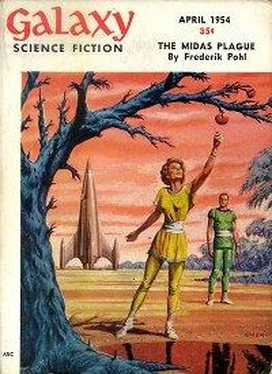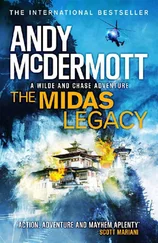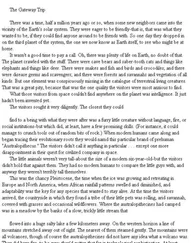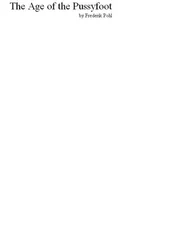Pohl Frederik - The Midas Plague
Здесь есть возможность читать онлайн «Pohl Frederik - The Midas Plague» весь текст электронной книги совершенно бесплатно (целиком полную версию без сокращений). В некоторых случаях можно слушать аудио, скачать через торрент в формате fb2 и присутствует краткое содержание. Год выпуска: 1954, Издательство: Galaxy Publishing Corporation, Жанр: Фантастика и фэнтези, на английском языке. Описание произведения, (предисловие) а так же отзывы посетителей доступны на портале библиотеки ЛибКат.
- Название:The Midas Plague
- Автор:
- Издательство:Galaxy Publishing Corporation
- Жанр:
- Год:1954
- ISBN:нет данных
- Рейтинг книги:5 / 5. Голосов: 1
-
Избранное:Добавить в избранное
- Отзывы:
-
Ваша оценка:
- 100
- 1
- 2
- 3
- 4
- 5
The Midas Plague: краткое содержание, описание и аннотация
Предлагаем к чтению аннотацию, описание, краткое содержание или предисловие (зависит от того, что написал сам автор книги «The Midas Plague»). Если вы не нашли необходимую информацию о книге — напишите в комментариях, мы постараемся отыскать её.
The Midas Plague — читать онлайн бесплатно полную книгу (весь текст) целиком
Ниже представлен текст книги, разбитый по страницам. Система сохранения места последней прочитанной страницы, позволяет с удобством читать онлайн бесплатно книгу «The Midas Plague», без необходимости каждый раз заново искать на чём Вы остановились. Поставьте закладку, и сможете в любой момент перейти на страницу, на которой закончили чтение.
Интервал:
Закладка:
“Please. Let’s try.”
She shrugged.
He went on remorselessly, “You aren’t happy, are you? And it’s because of—well, all this.” His gesture took in the richly furnished conservatory, the thick-piled carpet, the host of machines and contrivances for their comfort and entertainment that waited for their touch. By implication it took in twenty-six rooms, five cars, nine robots. Morey said, with an effort, “It isn’t what you’re used to, is it?”
“I can’t help it,” Cherry said. “Morey, you know I’ve tried. But back home—”
“Dammit,” he flared, “ this is your home. You don’t live with your father any more in that five-room cottage; you don’t spend your evenings hoeing the garden or playing cards for matchsticks. You live here, with me, your husband! You knew what you were getting into. We talked all this out long before we were married—”
The words stopped, because words were useless. Cherry was crying again, but not silently.
Through her tears, she wailed: “Darling, I’ve tried. You don’t know how I’ve tried! I’ve worn all those silly clothes and I’ve played all those silly games and I’ve gone out with you as much as I possibly could and—I’ve eaten all that terrible food until I’m actually getting fa-fa-ter! I thought I could stand it. But I just can’t go on like this; I’m not used to it. I—I love you, Morey, but I’m going crazy, living like this. I can’t help it, Morey— I’m tired of being poor!”
Eventually the tears dried up, and the quarrel healed, and the lovers kissed and made up. But Morey lay awake that night, listening to his wife’s gentle breathing from the suite next to his own, staring into the darkness as tragically as any pauper before him had ever done.
Blessed are the poor, for they shall inherit the Earth.
Blessed Morey, heir to more worldly goods than he could possibly consume.
Morey Fry, steeped in grinding poverty, had never gone hungry a day in his life, never lacked for anything his heart could desire in the way of food, or clothing, or a place to sleep. In Morey’s world, no one lacked for these things; no one could.
Malthus was right—for a civilization without machines, automatic factories, hydroponics and food synthesis, nuclear breeder plants, ocean-mining for metals and minerals…
And a vastly increasing supply of labor…
And architecture that rose high in the air and dug deep in the ground and floated far out on the water on piers and pontoons… architecture that could be poured one day and lived in the next…
And robots.
Above all, robots… robots to burrow and haul and smelt and fabricate, to build and farm and weave and sew.
What the land lacked in wealth, the sea was made to yield and the laboratory invented the rest… and the factories became a pipeline of plenty, churning out enough to feed and clothe and house a dozen worlds.
Limitless discovery, infinite power in the atom, tireless labor of humanity and robots, mechanization that drove jungle and swamp and ice off the Earth, and put up office buildings and manufacturing centers and rocket ports in their place…
The pipeline of production spewed out riches that no king in the time of Malthus could have known.
But a pipeline has two ends. The invention and power and labor pouring in at one end must somehow be drained out at the other…
Lucky Morey, blessed economic-consuming unit, drowning in the pipeline’s flood, striving manfully to eat and drink and wear and wear out his share of the ceaseless tide of wealth.
Morey felt far from blessed, for the blessings of the poor are always best appreciated from afar.
Quotas worried his sleep until he awoke at eight o’clock the next morning, red-eyed and haggard, but inwardly resolved. He had reached a decision. He was starting a new life.
There was trouble in the morning mail. Under the letterhead of the National Ration Board, it said:
“We regret to advise you that the following items returned by you in connection with your August quotas as used and no longer serviceable have been inspected and found insufficiently worn.” The list followed—a long one, Morey saw to his sick disappointment. “Credit is hereby disallowed for these and you are therefore given an additional consuming quota for the current month in the amount of 435 points, at least 350 points of which must be in the textile and home-furnishing categories.”
Morey dashed the letter to the floor. The valet picked it up emo-tionlessly, creased it and set it on his desk.
It wasn’t fair! All right, maybe the bathing trunks and beach umbrellas hadn’t been really used very much—though how the devil, he asked himself bitterly, did you go about using up swimming gear when you didn’t have time for such leisurely pursuits as swimming? But certainly the hiking slacks were used! He’d worn them for three whole days and part of a fourth; what did they expect him to do, go around in rags?
Morey looked belligerently at the coffee and toast that the valet-robot had brought in with the mail, and then steeled his resolve. Unfair or not, he had to play the game according to the rules. It was for Cherry, more than for himself, and the way to begin a new way of life was to begin it.
Morey was going to consume for two.
He told the valet-robot, “Take that stuff back. I want cream and sugar with the coffee— lots of cream and sugar. And besides the toast, scrambled eggs, fried potatoes, orange juice—no, make it half a grapefruit. And orange juice, come to think of it.”
“Right away, sir,” said the valet. “You won’t be having breakfast at nine then, will you, sir?”
“I certainly will,” said Morey virtuously. “Double portions!” As the robot was closing the door, he called after it, “Butter and marmalade with the toast!”
He went to the bath; he had a full schedule and no time to waste. In the shower, he carefully sprayed himself with lather three times. When he had rinsed the soap off, he went through the whole assortment of taps in order: three lotions, plain talcum, scented talcum and thirty seconds of ultra-violet. Then he lathered and rinsed again, and dried himself with a towel instead of using the hot-air drying jet. Most of the miscellaneous scents went down the drain with the rinse water, but if the Ration Board accused him of waste, he could claim he was experimenting. The effect, as a matter of fact, wasn’t bad at all.
He stepped out, full of exuberance. Cherry was awake, staring in dismay at the tray the valet had brought. “Good morning, dear,” she said faintly. “Ugh.”
Morey kissed her and patted her hand. “Well!” he said, looking at the tray with a big, hollow smile. “Food!”
“Isn’t that a lot for just the two of us?”
“Two of us?” repeated Morey masterfully. “Nonsense, my dear, I’m going to eat it all by myself!”
“Oh, Morey!” gasped Cherry, and the adoring look she gave him was enough to pay for a dozen such meals.
Which, he thought as he finished his morning exercises with the sparring-robot and sat down to his real breakfast, it just about had to be, day in and day out, for a long, long time.
Still, Morey had made up his mind. As he worked his way through the kippered herring, tea and crumpets, he ran over his plans with Henry. He swallowed a mouthful and said, “I want you to line up some appointments for me right away. Three hours a week in an exercise gym—pick one with lots of reducing equipment, Henry. I think I’m going to need it. And fittings for some new clothes—I’ve had these for weeks. And, let’s see, doctor, dentist—say, Henry, don’t I have a psychiatrist’s date coming up?”
Читать дальшеИнтервал:
Закладка:
Похожие книги на «The Midas Plague»
Представляем Вашему вниманию похожие книги на «The Midas Plague» списком для выбора. Мы отобрали схожую по названию и смыслу литературу в надежде предоставить читателям больше вариантов отыскать новые, интересные, ещё непрочитанные произведения.
Обсуждение, отзывы о книге «The Midas Plague» и просто собственные мнения читателей. Оставьте ваши комментарии, напишите, что Вы думаете о произведении, его смысле или главных героях. Укажите что конкретно понравилось, а что нет, и почему Вы так считаете.












